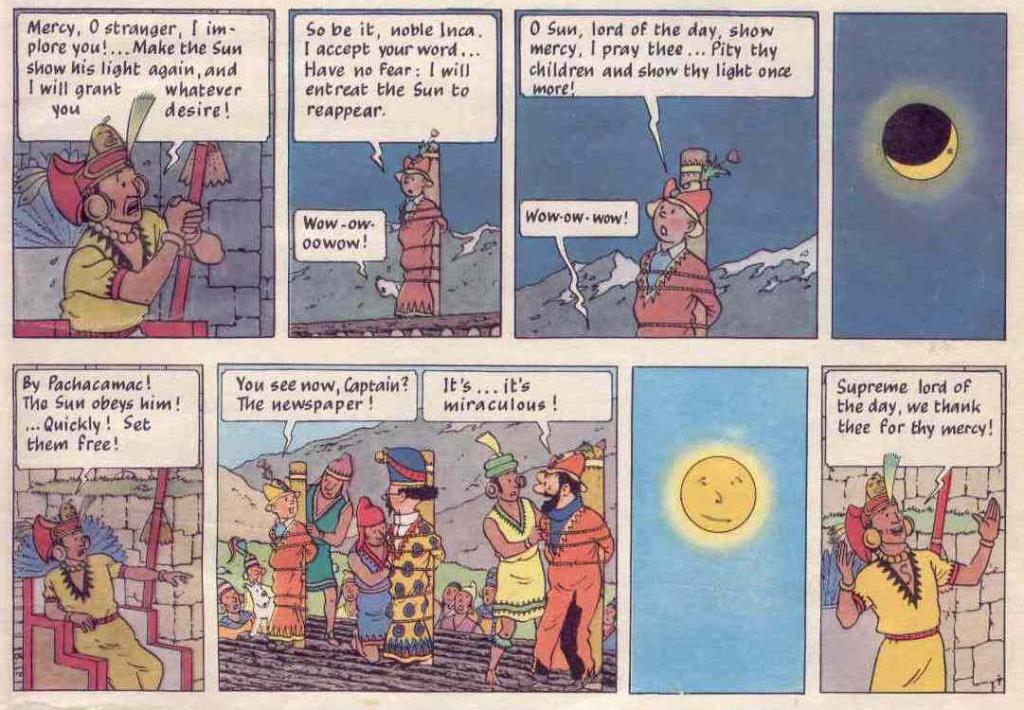I hope you had a chance to see the lunar eclipse yesterday. In southern Maryland it went full at about 6:45 in the morning, with the earth’s shadow turning the moon a dusky red. A line from Lucille Clifton’s “poem in praise of menstruation” came to mind as I gazed at moon:
if there is a river
more beautiful than this
bright as the blood
red edge of the moon
Literary passages about eclipses, however, are generally about the solar, not the lunar, variety. There is a racist scene, which the author later regretted, in a children’s comic strip I grew up with. In Temple of the Sun (1949) by the Belgian cartoonist Hergé (see above), the intrepid reporter Tintin uses his foreknowledge of an eclipse to escape being burned alive. Hergé later acknowledged that many ancient civilizations understood eclipses very well and regretted his depiction of the Incas.
He may have gotten the idea from Mark Twain’s Connecticut Yankee in King Arthur’s Court. Hank, who has been transported back to Arthurian England, uses his foreknowledge of an eclipse to escape execution. Here he is when he realizes that he has an escape:
“And I am to be burned alive to-morrow.” The boy shuddered.
“At what hour?”
“At high noon.”
“Now then, I will tell you what to say.” I paused, and stood over that cowering lad a whole minute in awful silence; then, in a voice deep, measured, charged with doom, I began, and rose by dramatically graded stages to my colossal climax, which I delivered in as sublime and noble a way as ever I did such a thing in my life: “Go back and tell the king that at that hour I will smother the whole world in the dead blackness of midnight; I will blot out the sun, and he shall never shine again; the fruits of the earth shall rot for lack of light and warmth, and the peoples of the earth shall famish and die, to the last man!”
I had to carry the boy out myself, he sunk into such a collapse. I handed him over to the soldiers, and went back.
Because of a date mix-up, there is some suspense but eventually the plan works out. Hank plays the scene for maximum theatrical effect:
With a common impulse the multitude rose slowly up and stared into the sky. I followed their eyes, as sure as guns, there was my eclipse beginning! The life went boiling through my veins; I was a new man! The rim of black spread slowly into the sun’s disk, my heart beat higher and higher, and still the assemblage and the priest stared into the sky, motionless. I knew that this gaze would be turned upon me, next. When it was, I was ready. I was in one of the most grand attitudes I ever struck, with my arm stretched up pointing to the sun. It was a noble effect. You could see the shudder sweep the mass like a wave.
After bargaining for his release and various powers, Hank has to stall the crowd—he can’t remember how long an eclipse lasts—but finally he sees the end near:
There was no response, for a moment, in that deep darkness and that graveyard hush. But when the silver rim of the sun pushed itself out, a moment or two later, the assemblage broke loose with a vast shout and came pouring down like a deluge to smother me with blessings and gratitude…
Twain ultimately is a bit more humble than Hergé, however. Maybe science can help us predict eclipses but it also can unleash holy hell upon the world. Hank’s vision of using technology to reform Arthurian England instead turns into an apocalyptic nightmare, and we see weapons of mass destruction unleashed to wipe out English knights. The 1889 novel all but foretells the devastation that World War I will visit upon the world 25 years later.
Men fantasize about blotting out the sun, women dream of being in sync with the moon. Which sounds healthier to you?



One Trackback
[…] after reading Silverberg’s book, I discovered Hergé’s Tintin adventure Prisoners of the Sun. I’ve since realized how Eurocentric and racist the book is, but at the time it enthralled […]